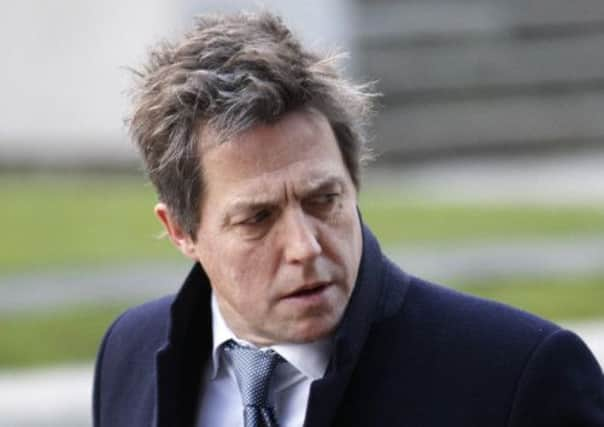Press freedom fears as MPs back watchdog plan


In a statement to parliament, Ms Miller said the proposal for a tougher version of the Press Complaints Commission had “fallen short” of the independence required for the new body following recommendations made by Lord Justice Leveson in his recent inquiry.
And the Tory Culture Secretary said the original Royal Charter agreed by all parties in Westminster on 18 March had now been expanded to Scotland, following discussions with the Scottish Government.
Advertisement
Hide AdAdvertisement
Hide AdShe said the Conservative side of the coalition would discuss further minor alterations, including arbitration fees for complainants. Friday’s final draft is to be agreed by the Privy Council on 30 October, she said.
But her statement sparked a furious debate in and outside the Commons, with concerns the all-party charter could be a “slippery slope” to ending the freedom of the press in the UK. The celebrity-backed protest group Hacked Off said it was “made in [Labour leader] Ed Miliband’s office over pizzas”.
Last night, Scottish Newspaper Society director John McLellan warned “there is no chance” the industry would sign up to the Royal Charter agreed by Labour, the Tories and Lib Dems, dismissing it as a “stitch-up”.
He said: “I think the industry will go ahead with setting up the Independent Press Standards Organisation [IPSO], which in the fullness of time will be seen as the best way forward.”
He went on: “IPSO more than meets the Leveson recommendations and is much tougher than what went before.”
But Hacked Off – which has called for much tougher regulation than the Royal Charter – said it feared Ms Miller would try to water down the Leveson recommendations further.
The group’s director, Brian Cathcart, said it was “regrettable” that further changes would be made to the cross-party charter and added that he would be watching closely to ensure there was no “dilution” of Lord Leveson’s recommendations.
He said: “The moment has come to ask the press, the big companies who run the national newspapers, to think again about their position.
Advertisement
Hide AdAdvertisement
Hide Ad“This is a solution to a long-standing problem affecting many, many ordinary people. This is the moment when they should do what the public wants them to do, what their readers want them to do, what Leveson suggests they should to do, what every party in parliament has suggested they should do.”
In parliament, MPs on both sides of the house warned of a risk to press freedoms.
Conservative MP and former journalist Richard Drax said: “The freedom of our press, for which millions of people died, is absolutely crucial.”
Labour veteran MP Kate Hoey also warned of a “slippery slope” towards a state-regulated press.
But among the MPs angered over the continued delay was Labour’s Chris Bryant, who has campaigned for tougher press regulation.
He said: “Surely to goodness it’s time we listened to the public, who have said in poll after poll that the self regulatory system was completely and utterly bust.
“If you default on this timetable, surely this House should take the matter into its own hands?”
A Scottish Government spokesman said: “As the UK Government’s Secretary of State for Culture, Media and Sport confirmed in her statement to the House of Commons confirmed, the Scottish Government has been in discussion with the UK government about this.”
Advertisement
Hide AdAdvertisement
Hide AdPress regulation options were proposed in the wake of the Leveson Inquiry, which was set up in July 2011 after it emerged journalists working for the now-closed News of the World had hacked into the mobile phone of murdered Surrey schoolgirl Milly Dowler.
But politicians and newspapers clashed over the details of a Royal Charter – a formal document that establishes and lays out the terms of a body – to underpin a new press regulator.
Spectator magazine editor Fraser Nelson, writing in a blog on the publication’s website, said it would “have no part in any government-mandated regulator” for the press.
Key points
• Newspapers can be fined up to £10 million for breaches of privacy or the new code.
• The regulator will be completely independent of the industry.
• The code will be drawn up by a body made up of serving editors and independent figures but agreed by a board containing no editors.
• The board of the new regulation body will be appointed by the Office for Public Office for Public Appointments.
• The Royal Charter can only be changed if two thirds of MPs agree to it in the Commons rather than just a simple majority.
Advertisement
Hide AdAdvertisement
Hide Ad• Complainants will not have to pay a fee to bring forward grievances against newspapers.
• Newspapers which do not sign up to the new Royal Charter backed body will be subject to larger fines in the courts.
ELSEWHERE
The Scotsman Conferences is hosting a series of events capturing the many facets of the Scottish independence debate. 3 December sees a formidable line up of expert speakers tackle “The Independence White Paper: A Business Plan for Scotland?” For more details on this and other great events please visit www.scotsmanconferences.com